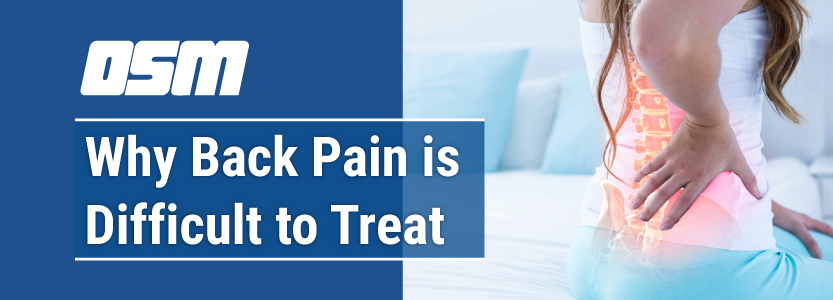Article featured on
WebMD
Two women come to their doctor with searing lower back pain and a fiery sensation shooting down their legs. Both women have back pain with sciatic-like symptoms, but the source and treatment of their pain are different.
Same Pain, Different Problems
Herniated disk. Helen had a herniated disk. The disk caused inflammation and nerve irritation, which resulted in fiery pain down her leg. Standard treatments for a herniated disk include physical therapy, medications, steroid injections, and time for healing.
Nerve sensitization. Nancy’s pain stemmed from nerve sensitization or nociplastic pain. Nociplastic pain arises from abnormal pain processing in the brain and nerves. Nerves become more sensitive and reactive to stimuli, exaggerating pain signals to the brain.
Nancy’s back and leg pain had slowly worsened over the past year. She developed pain hypersensitivity where simple, everyday movements—like getting up from the couch and walking to the kitchen—had become increasingly uncomfortable. Her symptoms also spread. Instead of pain in a small area of her back, she felt it across her back, down her thighs, and enveloping her leg.
Although an injury may have started Nancy’s pain, it was no longer the factor perpetuating it. Over time, the pain source had shifted from an injury to the nervous system (brain and nerves). Due to nerve sensitization, her brain and nerves kept telling her she was hurt even after the injury had healed.
You Can Have Both Sources of Pain at the Same Time
A mixed pain state is when you have injury pain and sensitization pain simultaneously. For example, you have back pain arising from a herniated disk and sensitization. Sensitization amplifies the pain signal that is already present. The two pain sources overlap into one set of symptoms, making it difficult to discern where the discomfort arises from.
For back pain, three different pain scenarios are possible:
- Back pain from an injury with no sensitization, meaning the nerves have not become sensitized; this situation will respond well to standard treatments. This was the case with Helen.
- Back pain from an injury and sensitization; in this case, there will be a partial response to standard treatments. This is a “mixed pain state.”
- Back pain with predominant sensitization, where most symptoms stem from sensitization; there will be minimal response to standard treatments. This was the case with Nancy.
Understanding the source of back pain is important for selecting the appropriate treatment. Standard treatments like physical therapy, anti-inflammatory medications, and steroid injections don’t work when the pain comes predominantly from sensitization. The more sensitization drives the symptoms, the less responsive they are to standard treatments because the pain source has shifted to the nervous system.
For example, Helen, with a herniated disc, responded well to treatment with physical therapy and a steroid injection. On the other hand, Nancy did not respond to those interventions. The correct target for her treatment is the nervous system. You don’t put a cast on a paralyzed arm from a stroke because the cause of the injury isn’t in the arm; it’s in the brain. The problem is deeper in the nervous system. The same is true when treating sensitization.
The Orthopedic & Sports Medicine Center of Oregon is an award-winning, board-certified orthopedic group located in downtown Portland Oregon. We utilize both surgical and nonsurgical means to treat musculoskeletal trauma, spine diseases, foot and ankle conditions, sports injuries, degenerative diseases, infections, tumors and congenital disorders.
Our mission is to return our patients back to pain-free mobility and full strength as quickly and painlessly as possible using both surgical and non-surgical orthopedic procedures.
Our expert physicians provide leading-edge, comprehensive care in the diagnosis and treatment of orthopedic conditions, including total joint replacement and sports medicine. We apply the latest state-of-the-art techniques in order to return our patients to their active lifestyle.
If you’re looking for compassionate, expert orthopedic and podiatric surgeons in Portland Oregon, contact OSM today.
Phone:
503-224-8399
Address
17355 Lower Boones Ferry Rd Suite 100A
Lake Oswego, OR 97035
Hours
Monday–Friday
8:00am – 4:30pm



